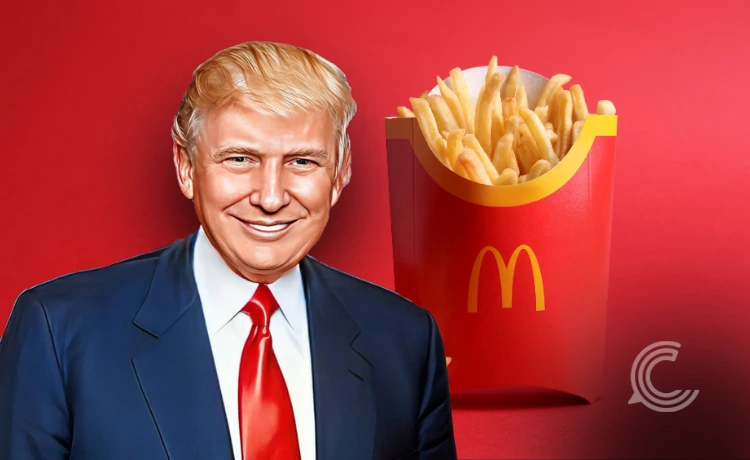Trump Talks Inflation Progress in Meeting with McDonald’s Leadership

Key Points:
- President Donald Trump addressed the McDonald’s Impact Summit, framing the franchise system as a model for economic prosperity and the American Dream
- The President emphasized his administration’s commitment to lowering the cost of living through tax cuts and regulatory rollbacks
- The meeting comes as the administration intensifies its focus on affordability amid persistent consumer concerns over rising prices
President Donald Trump recently took his economic prosperity message directly to American small business owners, speaking to McDonald’s franchise owners, operators, and suppliers at the company’s Impact Summit in Washington, D.C. The address strategically leveraged the iconic fast-food chain as a symbol of entrepreneurial opportunity and a key player in the nation’s struggle with affordability.
The President opened his remarks by praising McDonald’s, celebrating the company’s 70-year history of franchising as “70 years of American greatness” and a prime example of the American Dream in action. He stated, “For tens of millions of our citizens, the road to the American dream starts beneath the golden arches, beautiful golden arches.”
Addressing Affordability and Inflation
A central theme of the President’s address was the administration’s efforts to combat inflation and reduce the cost of living. Acknowledging the financial strain on households, President Trump pointed to recent government action as evidence of progress.
He asserted , “The Biden administration started the affordability crisis, and my administration is ending it. I’m ending it.” He asserted that his administration had brought inflation down to a “normal” level, adding, “We have it almost at the sweet spot.10 And prices are coming down on different things.”
The President also took time to thank the fast-food giant for reintroducing popular, lower-priced options. He said, “I want to give a very special thanks to McDonald’s for slashing prices for your most popular items, bringing back Extra Value Meals. We’re getting prices down for this country, and there’s no better leader or advocate than McDonald’s,” an effort widely seen as a response to budget-sensitive consumers feeling the pinch of inflation.
Policy Initiatives to Boost Real Income
President Trump detailed several policy proposals aimed at stimulating growth and improving household finances. He highlighted the importance of the massive tax and spending bill passed earlier this year, which permanently extended key tax provisions and aimed to incentivise domestic investment.
Beyond tax measures, the administration has also taken specific steps to lower costs on everyday goods. Just days before the summit, President Trump announced the elimination of tariffs on over 200 imported food items, including coffee, beef, and bananas, in a move widely viewed as an attempt to ease price pressures. Moreover, he has floated proposals like the possibility of 50-year mortgages to make housing more affordable and tariff-funded $2,000 rebate cheques for lower- and middle-income Americans.
The speech sought to cement the Republican position on economic prosperity, arguing that the administration’s tax and regulatory agenda ultimately benefits small businesses and the American worker.
A Focus on the Entrepreneur
The McDonald’s Impact Summit, attended by franchise owners, operators, and suppliers, served as an ideal platform to showcase the administration’s support for the franchise model.17 Franchised businesses are collectively responsible for the creation of nearly 850,000 local businesses, a figure the International Franchise Association has previously praised for highlighting their role in keeping prices affordable for the average American.
The President framed his economic vision as a fight “for an economy where everybody can win, from the cashier starting her first job to a franchisee opening their first location to the young family in a drive-through line.” This rhetoric aimed to connect the administration’s macro-economic policies to tangible, local opportunities.
The strategic decision to bring the inflation message to the fast-food counter, specifically the McDonald’s Impact Summit, was a calculated move to connect the administration’s economic prosperity agenda with the everyday experience of the American consumer. Fast-food prices, often referred to as “menu inflation,” are a highly visible and sensitive indicator for budget-conscious families, and the cost of a basic meal has become a popular news talking point illustrating the nation’s affordability crisis. By addressing McDonald’s franchise owners, who represent small business entrepreneurs and a major source of entry-level jobs, President Trump framed his policies, like tax cuts and regulatory relief, as direct efforts to lower the operational costs that drive up prices at the drive-thru.
This setting allowed him to contrast his actions with those of his predecessor, simultaneously praising the company for reintroducing value meals and attempting to own the affordability narrative in a setting that resonates immediately with millions of working-class voters



